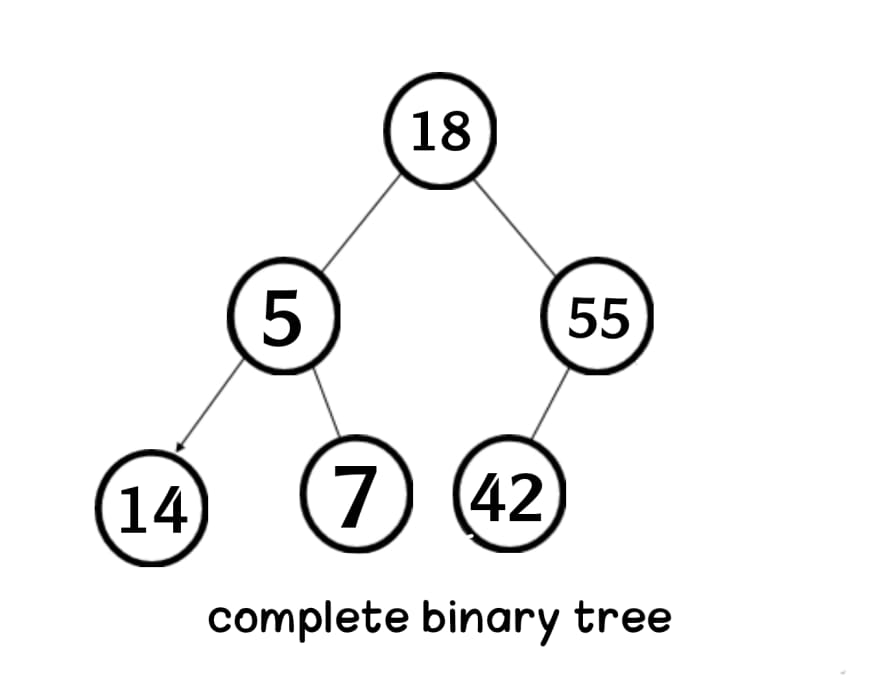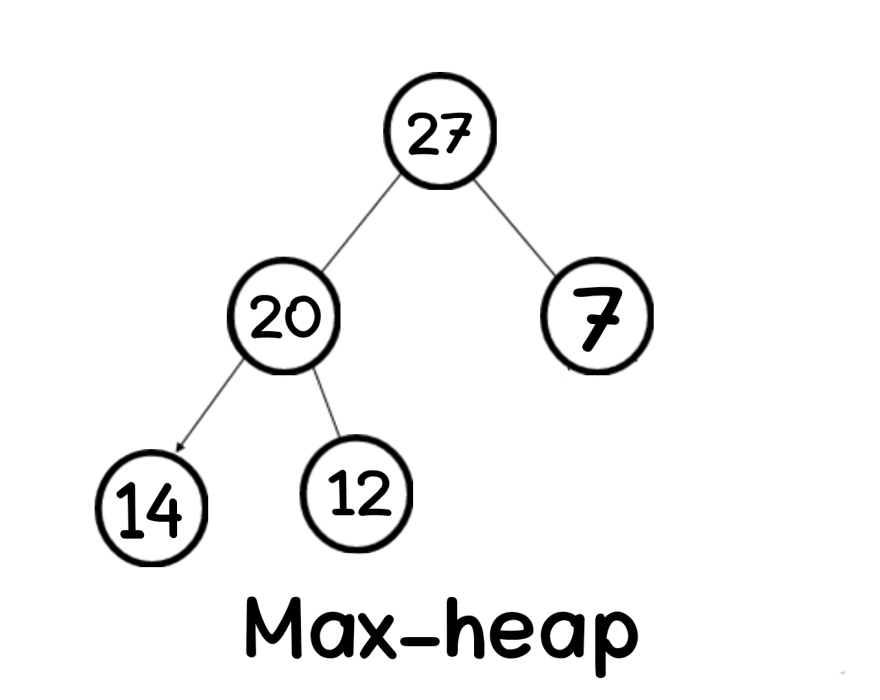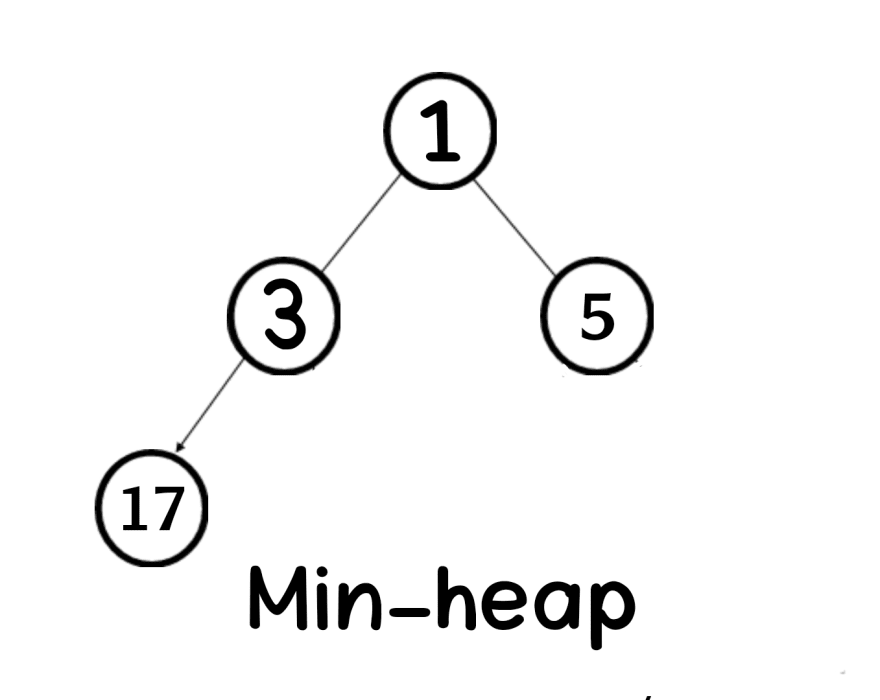26
Your complete guide to Heap data structure!
Hi, I'm Aya Bouchiha, in this beautiful day, I'm going to explain the Heap data structure.
#day_22
#day_22
Heap: is a complete binary tree (types of a binary tree) (which each node has at most two children and All the leaves should lean towards the left) where the root node is compared with its children and arrange accordingly.


The key of every node is smaller than or equal its parent
arr[parent] >= arr[i]
The key of every node is greater than or equal its parent
arr[parent] <= arr[i]
The space complexity of the heap is O(n)
| insertion (push) | deletion (pop) | peek |
|---|---|---|
| O(log n) | O(log n) | O(1) |
let's take this example of max-heap:
the index of each node is between parentheses ( ):
the index of each node is between parentheses ( ):
15(0)
/ \
(1) 9 13 (2)
/ \ /
(3)5 (4)7 (5)11arr = [15, 9, 13, 5, 7, 11]the implementation can be done by:
arr[0] = root
arr[(i - 1) // 2]
arr[2 * i + 1]
arr[2 * i + 2]
class MinHeap:
def __init__(self):
self.heap = []
self.heap_size = 0
def getParentNodeIndex(self, i: int) -> int:
return (i-1)//2
def getLeftChildNodeIndex(self, i: int) -> int:
return 2*i+1
def getRightChildNodeIndex(self, i: int) -> int:
return 2*i+2
def hasParent(self, i: int) -> bool:
# cheking if a node has a parent
return self.getParentNodeIndex(i) < len(self.heap)
def hasLeftChild(self, i: int) -> bool:
# cheking if a node has a left child
return self.getLeftChildNodeIndex(i) < len(self.heap)
def hasRightChild(self, i: int) -> bool:
# cheking if a node has a right child
return self.getRightChildNodeIndex(i) < len(self.heap)
def getMinValue(self) -> int:
"""
time complexity => O(1)
"""
return self.heap[0]
def printAll(self):
print(self.heap)- its parent is greater than or equal to it in a max-heap.
- its parent is smaller than or equal to it in min-heap.
For better understanding, let's take an example:
we want to insert 1 in this min-heap
we want to insert 1 in this min-heap
3 (0)
/ \
(1) 5 10 (2)
/
9 (3)[3, 5, 10, 9]3 (0)
/ \
(1) 5 10 (2)
/ \
(3)9 (4)1heap_size += 1
arr = [3, 5, 10, 9, 1]3 (0)
/ \
(1) 1 10 (2)
/ \
(3)9 (4)5arr = [3, 5, 10, 9, 1]
newElementIndex = len(arr) - 1 # 4
# the index of the parent of the new element
ParentIndex = (newElementIndex - 1) // 2 # (4-1)//2 = 1
# 1 < 5
if arr[newElementIdx] < arr[ParentIdx]:
# swap(1, 5)
arr[newElementIdx], arr[ParentIdx] = arr[ParentIdx], arr[newElementIdx]the array will be:
arr = [3, 1, 10, 9, 5]1 (0)
/ \
(1) 3 10 (2)
/ \
(3)9 (4)5we'll do the same process for 1 and 3 like (1 and 5) so the array will be
arr = [1, 3, 10, 9, 5]def bubbleUp(self, i: int):
parentIndex = self.getParentNodeIndex(i)
if parentIndex < 0:
parentIndex = 0
# Loops until it reaches a leaf node
while(i > 0 and self.heap[i] < self.heap[self.getParentNodeIndex(i)]):
# Swap the elements
self.heap[i], self.heap[self.getParentNodeIndex(i)] = self.heap[self.getParentNodeIndex(i)], self.heap[i]
i = self.getParentNodeIndex(i)def insert(self, value: int):
self.heap_size += 1
# insert the element at the end
self.heap.append(value)
# bubble up the new element
self.bubbleUp(len(self.heap) - 1)The standard deletion operation on Heap is deleting the root which is the maximum value of the max-heap, and the minimum value of the in-heap.
- the child is smaller than or equal to it in a max-heap.
- the child is greater than or equal to it in a min-heap.
For better understanding, let's take an example:
we want to delete 3 in this min-heap
we want to delete 3 in this min-heap
3 (0)
/ \
(1) 5 10 (2)
/
9 (3)[3, 5, 10, 9]9 (0)
/ \
(1) 5 10 (2)
/
(3)3arr = [9, 5, 10, 3]9 (0)
/ \
(1) 5 10 (2)arr = [9, 5, 10, 3]
heap_size -= 1
arr.pop()so the array will be
arr = [9, 5, 10]5 (0)
/ \
(1) 9 10 (2)arr = [5, 9, 10]def bubbleDown(self):
# the index of the root => 0
i = 0
while True:
smallest = None
leftChildIndex = self.getLeftChildNodeIndex(i)
rightChildIndex = self.getRightChildNodeIndex(i)
# if the node has not any child
if (not self.hasLeftChild(i) and not self.hasRightChild(i)):
break
# if the node has only a left child
elif (not self.hasRightChild(i)):
# the smallest variable will be the index of the left child
smallest = leftChildIndex
# if the node has only a right child
elif (not self.hasLeftChild(i)):
# the smallest variable will be the index of the right child
smallest = rightChildIndex
# if the node has 2 children
else:
# the smallest variable will be the smallest value of the 2 children
smallest = rightChildIndex if self.heap[rightChildIndex] < self.heap[leftChildIndex] else leftChildIndex
# if the node's value is greater than its one of children
if (self.heap[i] > self.heap[smallest]):
# swap the node with its child
self.heap[i], self.heap[smallest] = self.heap[smallest], self.heap[i]
# the i variable will be the index of the smallest value of the two children
i = smallest
# if the node's value is smaller than its one of children
else:
break
returndef delete(self):
# if the size the heap is one or the heap is empty(size = 0)
if self.heap_size <= 1:
self.heap = []
return
# replace last element with the root
self.heap[self.heap_size - 1], self.heap[0] = self.heap[0], self.heap[self.heap_size - 1]
# decrease the size of heap
self.heap_size -= 1
# delete last element
self.heap.pop()
self.bubbleDown()class MinHeap:
def __init__(self):
self.heap = []
self.heap_size = 0
def getParentNodeIndex(self, i: int) -> int:
return (i-1)//2
def getLeftChildNodeIndex(self, i: int) -> int:
return 2*i+1
def getRightChildNodeIndex(self, i: int) -> int:
return 2*i+2
def hasParent(self, i: int) -> bool:
# cheking if a node has a parent
return self.getParentNodeIndex(i) < len(self.heap)
def hasLeftChild(self, i: int) -> bool:
# cheking if a node has a left child
return self.getLeftChildNodeIndex(i) < len(self.heap)
def hasRightChild(self, i: int) -> bool:
# cheking if a node has a right child
return self.getRightChildNodeIndex(i) < len(self.heap)
def getMinValue(self) -> int:
"""
time complexity => O(1)
"""
return self.heap[0]
def insert(self, value: int):
self.heap_size += 1
# insert the element at the end
self.heap.append(value)
# bubble up the new element
self.bubbleUp(len(self.heap) - 1)
def bubbleUp(self, i: int):
parentIndex = self.getParentNodeIndex(i)
if parentIndex < 0:
parentIndex = 0
# Loops until it reaches a leaf node
while(i > 0 and self.heap[i] < self.heap[self.getParentNodeIndex(i)]):
# Swap the elements
self.heap[i], self.heap[self.getParentNodeIndex(i)] = self.heap[self.getParentNodeIndex(i)], self.heap[i]
i = self.getParentNodeIndex(i)
def delete(self):
# if the size the heap is one or the heap is empty(size = 0)
if self.heap_size <= 1:
self.heap = []
return
# replace last element with the root
self.heap[self.heap_size - 1], self.heap[0] = self.heap[0], self.heap[self.heap_size - 1]
# decrease the size of heap
self.heap_size -= 1
# delete last element
self.heap.pop()
self.bubbleDown()
def bubbleDown(self):
# the index of the root => 0
i = 0
while True:
smallest = None
leftChildIndex = self.getLeftChildNodeIndex(i)
rightChildIndex = self.getRightChildNodeIndex(i)
# if the node has not any child
if (not self.hasLeftChild(i) and not self.hasRightChild(i)):
break
# if the node has only a left child
elif (not self.hasRightChild(i)):
# the smallest variable will be the index of the left child
smallest = leftChildIndex
# if the node has only a right child
elif (not self.hasLeftChild(i)):
# the smallest variable will be the index of the right child
smallest = rightChildIndex
# if the node has 2 children
else:
# the smallest variable will be the smallest value of the 2 children
smallest = rightChildIndex if self.heap[rightChildIndex] < self.heap[leftChildIndex] else leftChildIndex
# if the node's value is greater than its one of children
if (self.heap[i] > self.heap[smallest]):
# swap the node with its child
self.heap[i], self.heap[smallest] = self.heap[smallest], self.heap[i]
# the i variable will be the index of the smallest value of the two children
i = smallest
# if the node's value is smaller than its one of children
else:
break
return
def printAll(self):
print(self.heap)
my_heap = MinHeap()
my_heap.insert(5)
my_heap.insert(10)
my_heap.insert(1)
my_heap.insert(2)
my_heap.insert(3)
my_heap.insert(4)
# 1
# / \
# 2 4
# / \ /
# 10 3 5
my_heap.printAll()
my_heap.delete()
my_heap.printAll()
# 2
# / \
# 3 4
# / \
# 10 5
print(my_heap.heap_size) # 5
print(my_heap.getMinValue()) # 2if you have any suggestions for the next posts or any questions you can contact me in telegram
Happy coding :)
#day_22
#day_22
26
